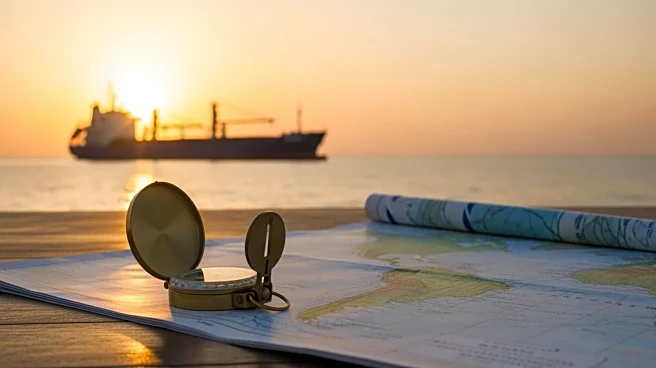What's Happening?
Pakistan is embarking on a significant maritime expansion plan, aiming to transform its blue economy, which has historically been underutilized. The federal government, led by Minister for Maritime Affairs
Muhammad Junaid Anwar Chaudhry, has announced plans to build three new deep-sea ports as part of a 'hundred-year maritime development program.' This initiative is supported by a newly formed multi-agency committee tasked with surveying the coastline to identify optimal locations for these ports. The expansion is intended to alleviate congestion, expedite cargo movement, and enhance Pakistan's role as a regional trade corridor. The plan also includes the development of smaller mini-ports to distribute economic activity more evenly across the coastline, potentially unlocking USD 100 billion to USD 150 billion in economic value.
Why It's Important?
The maritime expansion is crucial for Pakistan's economic growth, as it seeks to leverage its strategic geographic position at the junction of the Middle East, South Asia, Central Asia, and the Indian Ocean. By modernizing its port infrastructure, Pakistan aims to become a competitive maritime hub, especially as global supply chains are being recalibrated due to geopolitical tensions. The development of ports is expected to generate industries such as shipbuilding, seafood processing, and maritime tourism, creating jobs and boosting foreign exchange. Additionally, sustainable management of marine resources could revitalize coastal communities and explore untapped mineral wealth, contributing to environmental and social benefits.
What's Next?
The success of Pakistan's maritime expansion will depend on transparent regulation, modern technology, and disciplined long-term planning insulated from political cycles. The initiative requires a unified framework that aligns economic objectives with ecological protection and national security. The multi-agency committee's ongoing survey of the coastline is a critical step in determining the best locations for the new ports. As the program progresses, stakeholders will need to ensure coherence between federal and provincial jurisdictions, military and civilian institutions, and commercial and environmental priorities to avoid past mistakes.
Beyond the Headlines
The maritime expansion presents an opportunity for Pakistan to address longstanding issues of bureaucratic gridlock and infrastructural decay in its existing ports. By investing in modern deep-sea ports and smaller mini-ports, Pakistan can enhance its competitiveness and reduce delays that translate into lost revenue and disrupted supply chains. The initiative also highlights the potential for Pakistan to integrate its maritime sector into a long-term strategic framework, moving beyond academic discussions to actionable plans that could reshape the country's economic future.









